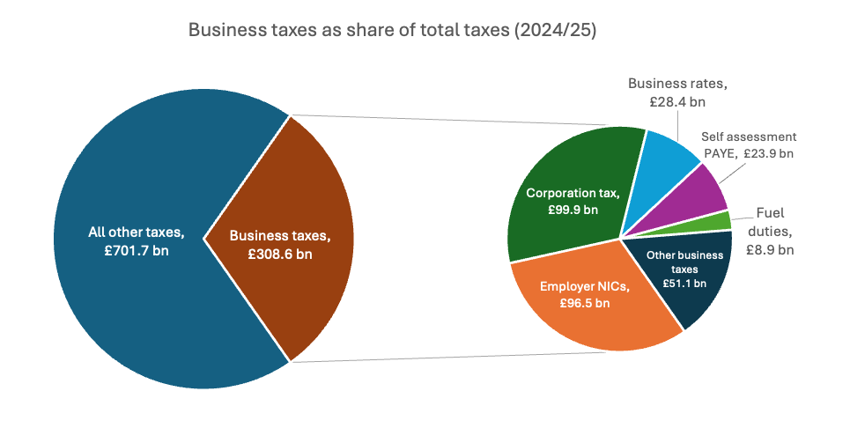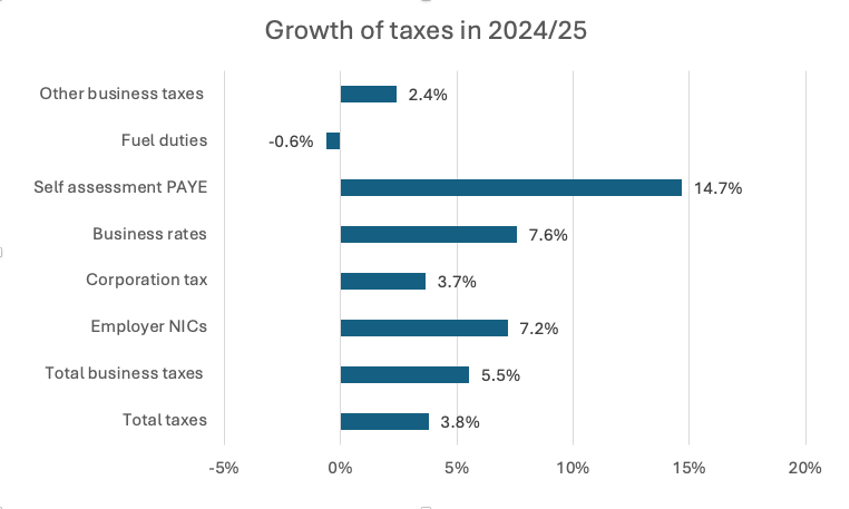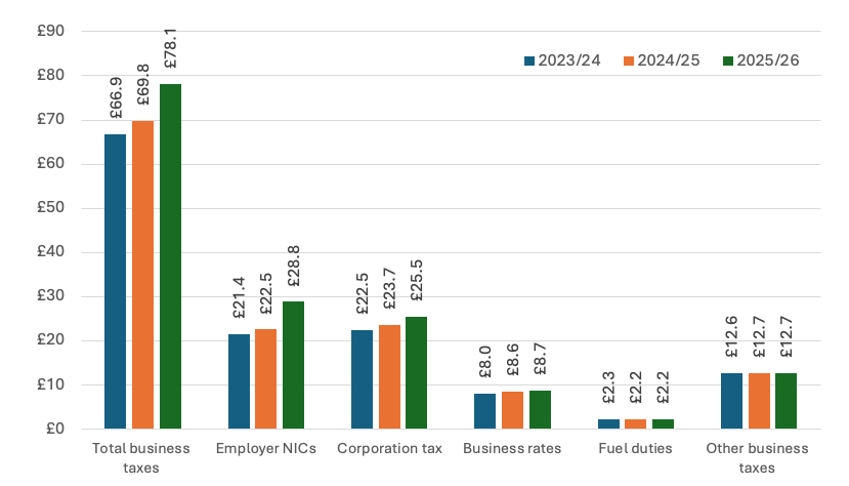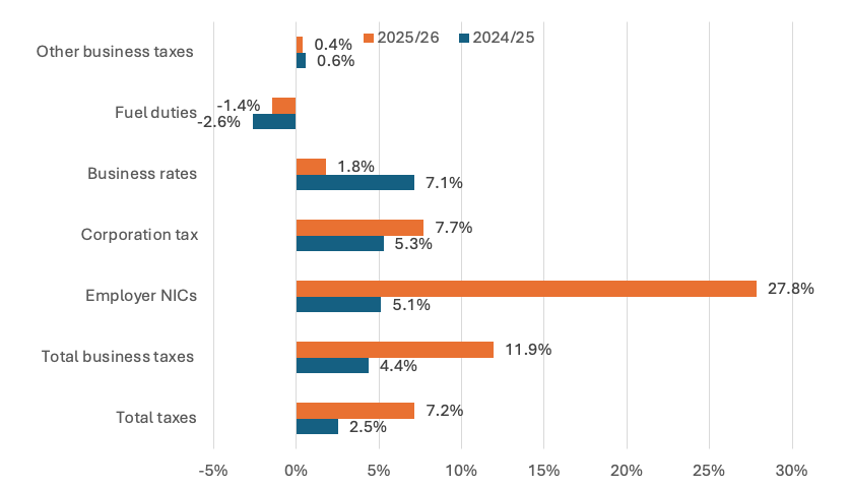Top lines
- In 2024/25, businesses paid £308.6bn in taxes, with corporation tax and employers’ NICs alone representing almost two-thirds (64%) of the total tax burden of businesses.
- The share of the tax burden on businesses has steadily increased since 2019/20 - reaching 30.5% in 2024/25, the highest in this century on a like-for-like basis.
- The share of the tax burden is projected to rise further in 2025/26. Based on data for the first three months of the 2025/26 financial year, the proportion could reach 32%, driven by a significant increase in national insurance contributions by employers.
- Business taxes in recent years have grown more quickly than the overall tax revenue, with the widening gap showing that businesses are shouldering a larger share of the tax growth. In 2024/25, businesses paid 5.5% more in taxes compared to the previous year, outstripping growth in overall tax revenues (3.8%).
- In the past five years, the introduction of new taxes such as the plastic packaging tax and the energy profits levy has compounded the pressure on businesses, adding £3.7bn more to the burden.
Methodology
Our primary source of data was the ONS’s monthly public sector receipts data. This dataset provides a monthly revenue figure for each type of income. From this, we filtered out the non-business-related revenues.
After filtering out non-relevant taxes, we needed to determine the share of each tax paid by businesses. If only businesses pay a specific tax, the share is 100%. This consists of revenues such as corporation tax, business rates, registration tax, etc. In some cases, however, we needed to estimate a specific share.
We explain our methodology for the most key taxes:
- Social contributions (includes NICs): we excluded employees’ NICs as that tax is paid by employees. We also excluded the share of employers’ NICs paid by the public sector. For historic data, we used the HMRC’s yearly tax receipt dataset, while for forecasts we used the OBR’s NICs estimates from their March 2025 Economic and Fiscal Outlook.
- Income tax paid through self-assessment: Income tax paid on sole traders' profits from self-employment is considered a business tax. We estimated their contribution from government data on personal income statistics. The dataset provides the number of self-employed by income range, and the mean of each range’s income.
- VAT: Where the goods or services offered by a company are VAT exempt, VAT is not charged to customers. This is the case for many financial services activities, so these companies cannot recover their input VAT, leading to irrecoverable VAT. We used the PwC’s report on the total tax contribution of financial services in 2023, and used their irrecoverable VAT paid as a proxy. While this is a slight underestimate as it excludes any irrecoverable VAT paid by non-financial businesses, the rest of the economy is not exposed to the same extent, or at all, to irrecoverable VAT.
- Other taxes such as fuel duties, insurance premium tax, stamp duty land tax, etc., were also estimated in a similar manner. We also excluded public sector employers to only account for private sector contributions. This is relevant to taxes such as the Apprenticeship Levy.
Results
Businesses in the UK continue to contribute significantly towards government revenues. This analysis shows that businesses paid £308.6 billion in taxes in 2024/25, a 30.5% contribution to total tax revenues.

Chart 1: Business tax contribution composition, 2024/25, per £bn
Corporation tax and employer NICs together make up 64% of the total tax businesses pay, representing over £196 billion in tax receipts for the Government. The next largest category is business rates, accounting for 9.2% of total taxes paid by businesses.
On top of the traditional business taxes, business pay a suite of “other” taxes. Together, these smaller taxes add up to £51.1 billion, or 16.6% of all taxes business pays. Environmental levies, irrecoverable VAT and Insurance Premium Tax make up more than 41% of this category, with the remainder coming from over 20 other business taxes. In the past five years, new taxes such as the plastic packaging tax and the energy profits levy have added £3.7bn more to the burden. Business paid 5.5% (£16.4bn) more in taxes in 2024/25 compared to 2023/24, outstripping growth in overall tax revenues (3.8%, or £36.9bn).

Chart 2: Growth in tax revenues between 2023/24 and 2024/25
Overall, all business taxes except for fuel duties saw an increase relative to last year. While the recent changes to employer NICs are not reflected in this chart as they take effect from April 2025, employer NICs tax receipts have been increasing steadily over the past decade. Tax receipts from business rates are also expected to rise as reliefs are reduced.

Chart 3: Tax revenues of the first three months of 2023/24, 2024/25, and 2025/26, per £bn
Based on data for the first three months of the 2025/26 financial year, taxes imposed on businesses continue to rise. From April to June, businesses contributed 31.7% of the total tax revenues. This share is expected to go up based on historic data, and it is also higher than over the same period in 2023/24 (29.8%) and 2024/25 (30.3%).

Chart 4: Growth in tax revenues between 2023/24-2024/25, and 2024/25-2025/26
Again, focusing on the first three months of the 2025/26 financial year, increases in business taxes outstripped the increase in total taxes, and every major tax except for business rates increased at a higher rate than in 2024/25. The most significant rise is in employer NICs: in the first quarter of the fiscal year, HMRC has collected almost 28% more revenue from employer NICs compared to Q1 2024/25. This sharp surge will mean that employer NICs will once again become the greatest tax burden on businesses, overtaking corporation tax, and can be largely attributed to the reforms announced in the 2024 Autumn Budget.
Next steps
Our analysis provides valuable insights into the tax burden faced by businesses at a high level, but there is scope for more in-depth analysis. Looking ahead, we plan to develop this into an annual publication and are currently seeking a partner or sponsorship to support this.
As part of our future work, we aim to examine sector-specific tax impacts and assess how the tax burden impacts businesses of different sizes. These insights will help inform more targeted and effective policy recommendations.
If you are interested in learning more or exploring potential collaboration opportunities, please get in touch with Mohammad Jamei, our Director of Economic Policy, at [email protected].









